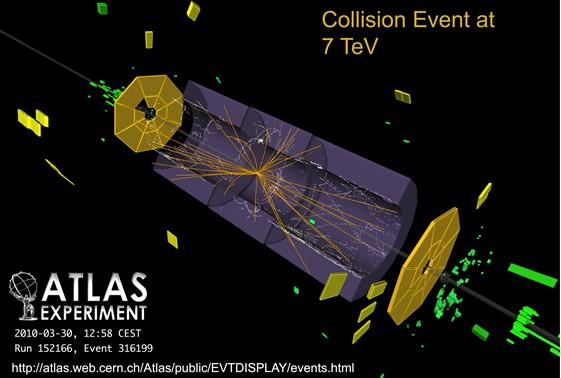This morning at 1:06 p.m. Central European Time, CERN’s Large Hadron Collider (LHC) began colliding particle beams at the highest energies ever reached by a man-made accelerator. This milestone marks the beginning of the LHC scientific program that researchers throughout the world have worked towards for over two decades. Some of the loudest cheers were from Canadians who helped design, build, and commission the LHC and the massive ATLAS experiment. A new era of discovery about how the universe works has been launched.
"It’s a great day to be a particle physicist," said CERN Director General Rolf Heuer. "A lot of people have waited a long time for this moment, but their patience and dedication is starting to pay dividends."
"With these record-shattering collision energies, the LHC experiments are propelled into a vast region to explore, and the hunt begins for dark matter, new forces, new dimensions and the Higgs boson," said ATLAS collaboration spokesperson, Fabiola Gianotti. "The fact that the experiments have published papers already on the basis of last year’s data bodes very well for this first physics run."
The LHC accelerates two counter-rotating beams of protons to nearly the speed of light and then brings them into collision inside giant, cathedral-sized detectors that study the subatomic debris that comes flying outward. The Canadian team plays a leading role in the ATLAS detector, akin to a gigantic digital camera that examines the millions of collisions per second and identifies which ones should be stored and analyzed in more detail. The project goals are just as awe-inspiring: probe the structure of space to search for extra dimensions, identify and study why matter has mass in the universe, and even explore theories that connect subatomic particles to the cosmos through dark matter and dark energy.
"This is the breakthrough moment we have all been waiting for," said Rob McPherson, spokesperson and Principal Investigator for the 200 person Canadian team, professor at the University of Victoria, and Institute of Particle Physics Research Scientist. "The LHC was conceived of more than two decades ago, and today’s success represents the start of a new era in our understanding of the makeup of matter and the universe. In Canada alone we have nearly 100 graduate students awaiting these data, and they will be among the first to study matter at this new energy frontier."
Nigel S. Lockyer, Director of TRIUMF, Canada’s national laboratory for particle and nuclear physics, commented, "It is a crucial hand-off, from ensuring that the machines are running to taking data and doing physics. This has been a smooth transition---and now we’re cruising. ATLAS is a global project and it’s an incredible opportunity for Canadians to be part of the team that is peeling back another layer of the onion about how the universe works."
TRIUMF worked with universities and companies across Canada to contribute key elements of the Large Hadron Collider accelerator itself as well as the ATLAS detector. TRIUMF is also home to one of the ten supercomputer (so-called Tier-1) data centres around the world that processes the enormous volumes of data from the ATLAS experiment and distributes it to the thousands of scientists involved. In fact, today’s collisions "showed up" in the Canadian computer centre within hours, ready for Canadian scientists to start analyzing them.
This milestone was achieved after a major refit of the LHC demonstrating the excellent performance of the updated machine. The LHC will now run for the next 18 months, and the data collected by ATLAS will allow scientists to probe the origins of matter to an unprecedented precision where physics theories predict new phenomena will lie. Whether the LHC discovers the Higgs Boson, Supersymmetry, new dimensions in space or time, or something that scientists have not yet imagined, our understanding of the universe promises to advance in a breathtakingly large step.
Follow LHC progress on twitter at http://www.twitter.com/cern. For photos, video and latest information see http://press.web.cern.ch/press/lhc-first-physics/. For more information about Canadian involvement in the LHC and ATLAS, see http://www.atlas-canada.ca/.
|  |
| Display of first collision events in ATLAS | CERN Control Room |
-- Based on TRIUMF press release

